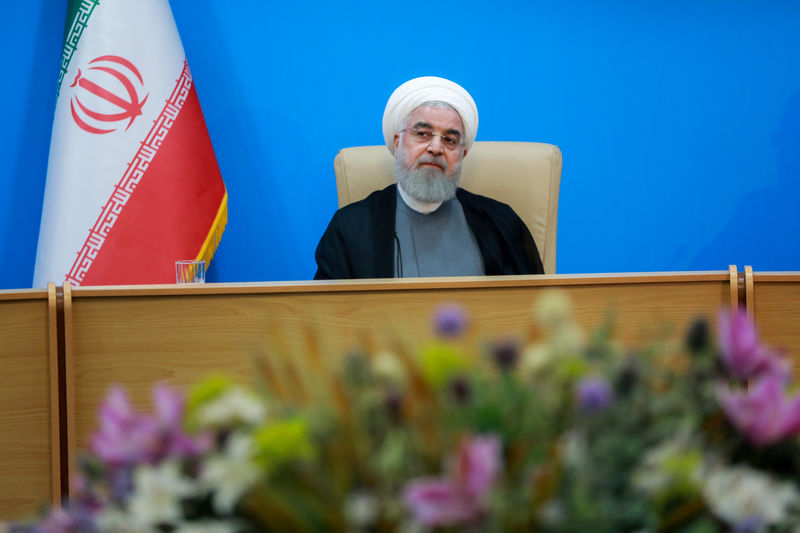By Babak Dehghanpisheh
GENEVA (Reuters) - U.S. President Donald Trump warned Iran on Wednesday against making threats that can "come back to bite you like nobody has been bitten before," after Tehran announced it would breach a 2015 nuclear deal.
President Hassan Rouhani announced that after July 7 Iran would enrich uranium beyond a fissile purity of 3.67%, which is the maximum allowed by the deal and a level which is deemed suitable for electricity generation.
It is the second time this week that Tehran has announced a measure that undermines the nuclear accord, which has been in trouble since Trump pulled the United States out of it last year.
"Our level of enrichment will no longer be 3.67. We will put this commitment aside by whatever amount we feel like, by whatever amount is our necessity, our need. We will take this above 3.67," said Rouhani, according to IRIB news agency.
Enrichment to 90% yields nuclear bomb-grade material.
Trump responded with a post on social media, saying: "Iran has just issued a New Warning. Rouhani says that they will Enrich Uranium to 'any amount we want' if there is no new Nuclear Deal. Be careful with the threats, Iran. They can come back to bite you like nobody has been bitten before!"
Experts said Iran has no legitimate use for uranium enriched beyond the level permitted by the deal.
“There is no justification,” said Kelsey Davenport of the Arms Control Association, a Washington advocacy organisation.
The move, she said, was aimed at increasing pressure on European powers, China and Russia to compensate Iran for the impact of U.S. sanctions reimposed by Trump after he renounced the deal.
“These are political decisions to increase leverage. They are no indications that Iran is about to dash to a bomb or pursue nuclear weapons,” Davenport said.
Tehran has denied any intent to develop nuclear weapons.
Rouhani added that the Islamic Republic's actions were reversible. "All of our actions can be returned to the previous condition within one hour, why are you worried?" he said.
TOUGH TONE
His tone was unusually tough. Rouhani was the Iranian architect of the nuclear pact and is seen as a pragmatist, unlike senior clerics in the ruling elite who opposed his opening to the West and have kept up their denunciations of the United States.
Rouhani further urged the Trump administration to "adopt a rational approach again" and return to the negotiating table.
Weeks of tensions with Washington crested last month when Tehran shot down a U.S. military surveillance drone and Trump responded with a decision to launch air strikes only to call them off at the last minute. Washington also accused Iran of being behind attacks on several oil tankers in the Gulf, which Tehran denies.
Iran on Monday said it has amassed more low-enriched uranium than the 300 kg (661 lbs) permitted under the nuclear pact, prompting Trump to warn it was "playing with fire".
European nations who are part of the nuclear deal said on Tuesday they were "extremely concerned" by Tehran's stockpiling announcement while Israel said it was preparing for possible involvement in any military confrontation between Iran and the United States.
Rouhani said that if the nations in the pact did not protect trade with Iran promised under the deal but blocked by Trump's reimposition of tough sanctions, Tehran would also start to revive its Arak heavy-water reactor after July 7.
As required by the accord, Iran said in January 2016 that it had removed the core of the reactor and filled it with cement.
"From (July 7) onward with the Arak reactor, if you don't operate (according to) the programme and time frame of all the commitments you've given us, we will return the Arak reactor to its previous condition," said Rouhani.
"Meaning, the condition that you say is dangerous and can produce plutonium," he said, referring to a key potential component of a nuclear bomb. "We will return to that unless you take action regarding all your commitments regarding Arak."
He kept the door open to negotiations, saying Iran would again reduce its stockpile of enriched uranium below the 300-kg limit set by the pact if Britain, France, Germany, Russia and China honoured their deal pledges.
Iran will gain nothing by departing from the terms of the deal, the French foreign ministry cautioned on Wednesday.
"Putting (the deal) into question will only increase the already heightened tensions in the region," ministry spokesman Agnes von der Muhll told reporters in a daily briefing.
Tensions between Washington and Tehran have escalated since Trump pulled Washington out of the pact in May 2018 and acted to bar all international sales of Iranian oil, the Islamic Republic's economic lifeblood.
Iranian Foreign Minister Mohammad Javad Zarif denies that Iran is in violation of the nuclear accord by exceeding the cap on low-enriched uranium, saying Iran is exercising its right to respond after the U.S. withdrawal.
The nuclear accord lifted most global sanctions against Iran in return for curbs on its uranium enrichment capacity.
It aimed to extend the time Tehran would need to produce a nuclear bomb, if it chose to, from roughly 2-3 months to a year.

Iran's main demand - in talks with the European parties to the deal and as a precondition to any talks with the United States - is to be allowed to sell its oil at the levels that prevailed before Trump left the deal and restored sanctions.